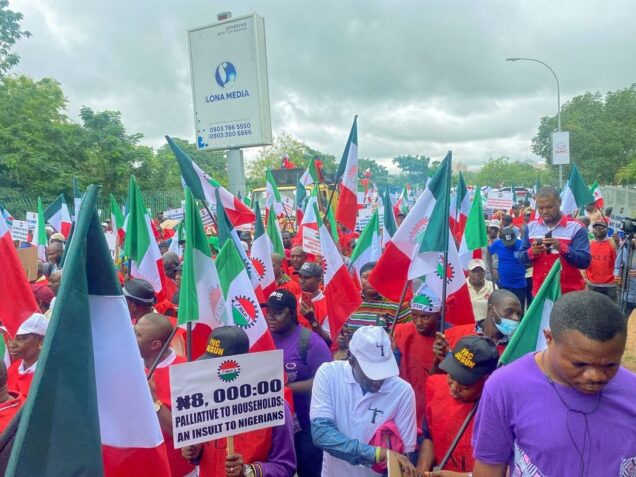
Despite the implementation of the ₦70,000 national minimum wage across Nigeria’s 36 states and the Federal Capital Territory (FCT), many workers remain financially strained due to persistent inflation and the high cost of living.
Labour unions and civil society groups have raised fresh concerns, arguing that the wage increase though well-intentioned has failed to deliver the desired economic relief.
According to data obtained by The Guardian, the average minimum wage across Nigerian states stands at ₦73,471.43, slightly above the federally mandated ₦70,000, representing a modest 5% increase. Some states, including Lagos, Delta, Rivers, Oyo, Akwa Ibom, Bayelsa, Enugu, and Niger, have gone above the national average. Yet, workers in these states still find it difficult to afford basic necessities such as food, housing, transportation, and healthcare.
Inflation Erodes Wage Value
Since the passage of the National Minimum Wage Act in July 2024, inflation has significantly undermined the purchasing power of Nigerian workers. At the time President Bola Tinubu signed the bill into law, inflation was at a staggering 33.4%. While inflation has slightly declined to 23.18% as of February 2025, the price of essential goods and services remains unaffordable for many households.
In real terms, the average minimum wage now holds a value of approximately ₦55,000 when adjusted for inflation. This decline has prompted renewed calls from labour leaders for a reassessment of the wage policy before the next scheduled negotiation in 2027.
Cost of Living Far Exceeds Minimum Wage
The rising cost of living has stretched household budgets to the breaking point. According to the National Bureau of Statistics (NBS), a healthy daily diet for one adult in Nigeria costs around ₦1,255. Over the course of a month, this amounts to ₦37,650—more than half of a worker’s ₦70,000 monthly salary. This calculation excludes other essential expenses such as rent, electricity, transportation, school fees, and fuel.
With the deregulation of the petroleum sector and the removal of fuel subsidies, transportation and logistics costs have also risen sharply, affecting prices across the board. These economic pressures have led many workers to demand further wage adjustments.
Mixed Progress Across States
While states like Abia, Adamawa, Anambra, and Bauchi have implemented the ₦70,000 minimum wage, others have made more generous adjustments. Akwa Ibom and Bayelsa, for instance, raised their minimum wage to ₦80,000 starting in November 2024. Enugu State, while yet to formally conclude negotiations, has also begun provisionally paying its workers ₦80,000.
However, some state governments have not initiated consequential adjustments, a key component that ensures salaries across various levels reflect inflation and economic realities. The delay has contributed to worker dissatisfaction and growing agitation.
Labour Leaders Demand Further Action
Labour leaders have emphasized that the current minimum wage is far from sufficient. Nigeria Labour Congress (NLC) President, Joe Ajaero, criticised the federal government for reneging on its promise not to raise fuel prices, a condition that influenced labour’s acceptance of the ₦70,000 wage in the first place.
Similarly, Peters Adeyemi, General Secretary of the Non-Academic Staff Union (NASU), noted that although reducing the wage review cycle from five years to three is commendable, the government must go further to ensure wages are promptly adjusted in line with economic shifts.
Civic Voices Echo Workers’ Concerns
Human rights advocate Emmanuel Onwubiko, who serves as the National Coordinator of the Human Rights Writers Association of Nigeria (HURIWA), also weighed in on the issue. He asserted that the ₦70,000 minimum wage does not merit applause, arguing that the figure falls far short of meeting the basic cost of living in today’s Nigeria. He urged both state and federal governments to act decisively to review the wage upward.
On the other hand, Tolulope Alayande, an investment banker, took a more measured view. He acknowledged the inadequacy of the current wage but described it as a step in the right direction, especially given Nigeria’s ongoing economic reforms. He noted that while the removal of fuel subsidies was painful, it was a necessary decision to restore long-term fiscal stability.
Looking Ahead
As Nigeria continues to grapple with inflation and rising living costs, discussions between labour unions and government authorities are expected to intensify in the months ahead. Stakeholders insist that any meaningful wage reform must be dynamic, inflation-adjusted, and supported by broader policies aimed at economic inclusion and social protection.
Without timely and strategic interventions, the gap between minimum wage and living wage is likely to widen, worsening inequality and worker unrest across the country.





